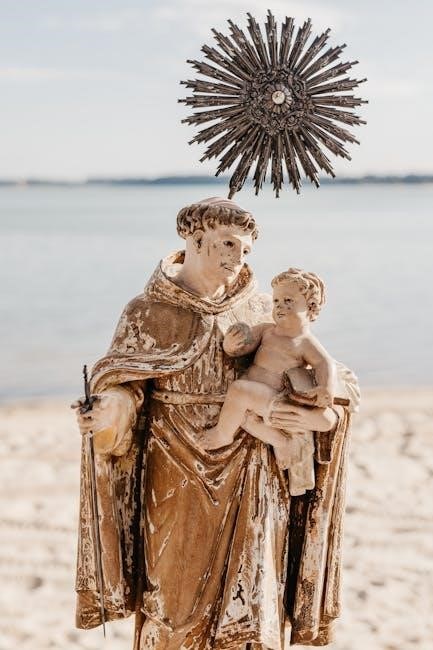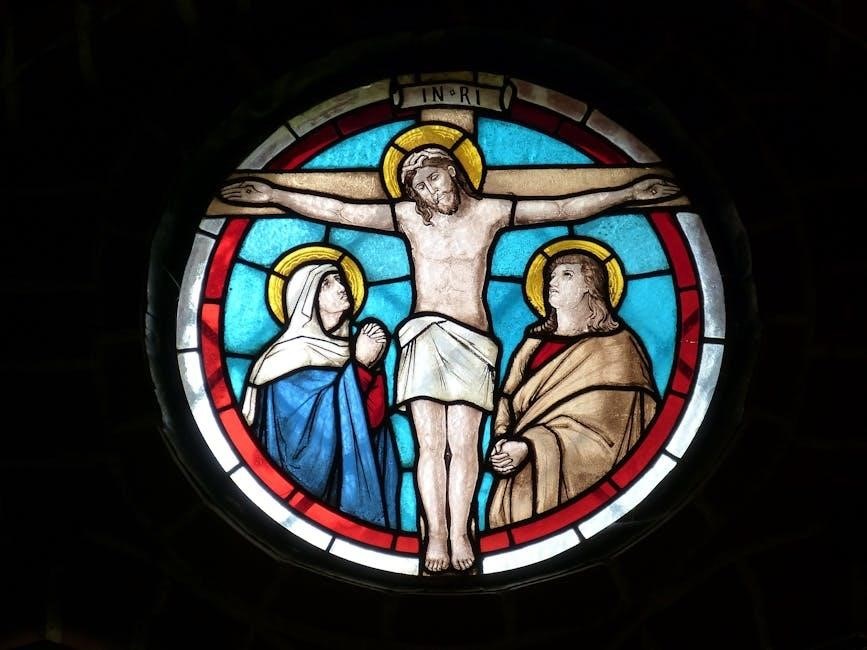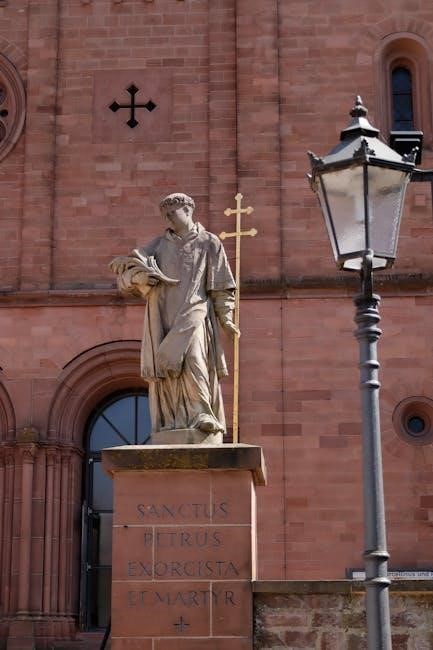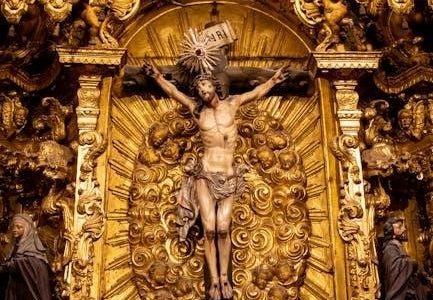The Profession of Faith is a solemn declaration of belief in the teachings of the Catholic Church, affirming adherence to its doctrines and traditions. It includes the Nicene-Constantinopolitan Creed, emphasizing the unity of God, the divinity of Jesus Christ, and the Holy Spirit’s role. This profession serves as a foundational commitment for Catholics, ensuring fidelity to the Church’s teachings and fostering spiritual unity among the faithful.
1.1 Definition and Purpose
The Profession of Faith is a formal declaration of belief in the core teachings of the Catholic Church, affirming adherence to its doctrines and traditions. It includes the Nicene-Constantinopolitan Creed, which outlines the Church’s understanding of the Trinity, the divinity of Jesus Christ, and the Holy Spirit. The purpose of this profession is to publicly affirm one’s commitment to the Catholic faith, ensuring fidelity to the Church’s teachings and fostering spiritual unity among the faithful. It is often required for those assuming roles within the Church.
1.2 Historical Context
The Profession of Faith traces its roots to early Christianity, where creeds like the Apostles’ Creed and the Nicene-Constantinopolitan Creed were used to affirm belief in the Trinity and the divinity of Jesus Christ. The Nicene Creed, established in 381 AD, remains central to the Profession. Over centuries, the Church refined its doctrines, with the Council of Trent reinforcing the Creed’s importance. In 1998, Pope John Paul II’s Apostolic Letter Ad Tuendam Fidem updated the Profession, ensuring fidelity to Church teachings and addressing modern challenges to the faith.
1.3 Importance in Catholic Doctrine
The Profession of Faith is central to Catholic doctrine, serving as a declaration of adherence to the Church’s teachings. It includes the Nicene-Constantinopolitan Creed, which affirms belief in the Trinity, the divinity of Jesus Christ, and the Holy Spirit. This profession unifies the faithful, reinforcing their commitment to the Church’s doctrines and moral teachings. It is a public affirmation of faith, ensuring fidelity to the Magisterium and guiding Catholics in their spiritual lives and decisions, while upholding the integrity of Catholic doctrine worldwide.

Key Elements of the Profession of Faith
The Profession of Faith includes the Nicene-Constantinopolitan Creed, affirming belief in the Trinity, and three propositions: belief in God’s Word, acceptance of Church teachings, and submission to the Magisterium.
2.1 The Nicene-Constantinopolitan Creed

The Nicene-Constantinopolitan Creed is a foundational statement of Catholic faith, recited during Mass and in the Profession of Faith. It affirms belief in one God, the Father Almighty, Creator of heaven and earth, and in Jesus Christ, the Son of God, incarnate through the Holy Spirit. It also professes faith in the Holy Spirit, the Church, and the resurrection of the dead. This creed, rooted in the Councils of Nicaea and Constantinople, is a concise summary of Catholic doctrine and a cornerstone of the Profession of Faith document.
2.2 The Role of Tradition and Scripture
In the Catholic Profession of Faith, Tradition and Scripture are inseparable sources of divine revelation. Scripture, as the written Word of God, provides the foundation for Catholic beliefs. Tradition, handed down through the Church, interprets and enriches the understanding of Scripture. Together, they guide the faithful in accepting and living out the teachings of Christ. The Magisterium ensures that both are authentically interpreted, maintaining the integrity of Catholic doctrine and fostering a deepened faith among believers.
2.3 The Three Propositions of the Profession of Faith
The Profession of Faith includes three key propositions. First, it affirms the Nicene-Constantinopolitan Creed, summarizing Catholic beliefs in the Trinity and the mysteries of Christ. Second, it declares belief in all truths revealed by God, whether through Scripture or Tradition, as interpreted by the Church. Third, it commits to accepting all definitive teachings of the Church on faith and morals. These propositions ensure a comprehensive and faithful adherence to Catholic doctrine, guiding believers in their spiritual journey.

The Role of the Magisterium
The Magisterium, the teaching authority of the Church, interprets and upholds Catholic doctrine, ensuring fidelity to divine revelation. It includes the Roman Pontiff and the College of Bishops, guiding the faithful in understanding and adhering to the Church’s teachings, as expressed in the Profession of Faith and related documents.
3.1 The Authority of the Roman Pontiff
The Roman Pontiff, as the successor of St. Peter, holds supreme authority over the universal Church. His infallibility ensures the preservation of divine truth. The Profession of Faith requires acceptance of his teachings, emphasizing submission of will and intellect to his Magisterium, crucial for maintaining unity and doctrinal integrity.
3.2 The College of Bishops and Their Teachings
The College of Bishops, united with the Roman Pontiff, shares in the Church’s teaching authority. Their collective Magisterium, guided by the Holy Spirit, ensures the faithful transmission of Catholic doctrine. The Profession of Faith obliges adherence to their teachings, fostering unity and preserving the integrity of the Church’s moral and doctrinal traditions, as outlined in the Code of Canon Law and the Apostolic Letter Ad Tuendam Fidem.
3.3 The Universal Magisterium
The Universal Magisterium represents the Church’s authoritative teaching office, encompassing both the Roman Pontiff and the College of Bishops. It ensures the faithful preservation and transmission of Catholic doctrine worldwide. The Profession of Faith requires adherence to this Magisterium, affirming the Church’s role in guiding believers in matters of faith and morals. This commitment is essential for maintaining unity and upholding the integrity of Catholic teachings, as emphasized in the Profession of Faith document and related canonical regulations.

The Oath of Fidelity
The Oath of Fidelity is a solemn promise to uphold the teachings of the Catholic Church, ensuring communion with its authority and fidelity to its doctrines.
4.1 Purpose and Significance
The Oath of Fidelity serves to ensure the faithful adherence of individuals to the teachings and governance of the Catholic Church. It is a public commitment to uphold the deposit of faith in its entirety, avoiding any doctrines contrary to Church teachings. This oath is particularly significant for those assuming roles within the Church, as it reinforces their duty to maintain communion and faithfully fulfill their responsibilities. Its purpose is to safeguard the integrity of Catholic doctrine and governance, ensuring unity and fidelity among the faithful.
4.2 Specific Promises and Commitments

The Oath of Fidelity requires individuals to promise communion with the Catholic Church, fulfilling duties with care and fidelity. They must uphold the deposit of faith, avoid contrary teachings, and follow ecclesiastical laws. The oath also includes a commitment to obey the teachings of the Bishops and the Roman Pontiff, ensuring the Church’s governance is carried out in unity. This pledge is essential for maintaining the integrity of Catholic doctrine and ensuring faithful service within the Church’s structure.
4.3 Consequences of Violating the Oath
Violating the Oath of Fidelity can result in canonical penalties, as outlined in Church law. Those who reject definitive teachings of the Magisterium face disciplinary actions to uphold the integrity of Catholic doctrine. Canon 1371 emphasizes penalties for such violations, ensuring the Church’s teachings are preserved and respected. This underscores the seriousness of the oath and the importance of maintaining fidelity to the Church’s doctrines and moral guidelines.
Practical Applications of the Profession of Faith
The Profession of Faith is integral to Catholic education, guiding teachings and sacramental practices. It ensures fidelity in Church governance and inspires lay faithful to live according to Catholic doctrine and moral principles, fostering unity and authenticity in their spiritual lives and communal practices.
5.1 In Catholic Education and Teaching
The Profession of Faith is a cornerstone in Catholic education, ensuring teachers and educators uphold Church doctrine. It is often required for those teaching in Catholic schools, reinforcing fidelity to Catholic beliefs. The Creed and Church teachings are integrated into curricula, guiding students in understanding divine revelation. This commitment fosters an environment where faith and reason are harmonized, preparing students to live according to Catholic principles and values, while promoting unity and authenticity in their spiritual journey.
5.2 In the Sacraments and Church Governance
The Profession of Faith is integral to Church governance and sacramental life, ensuring fidelity to Catholic doctrine. It is required for those holding ecclesiastical offices, reinforcing their commitment to Church teachings. The Creed is recited during liturgical celebrations, such as the Eucharist, emphasizing unity in belief. This profession also underpins the administration of sacraments, ensuring their validity and proper celebration. By upholding the Creed, the Church maintains authenticity in governance and worship, fostering a unified and faithful community.
5.3 In the Lives of Lay Faithful
The Profession of Faith deeply influences the lives of lay Catholics, serving as a personal commitment to Church teachings. It guides their moral and ethical decisions, fostering a life aligned with Catholic doctrine. The Creed, central to this profession, is often recited in personal prayer and communal worship, reinforcing belief in God, Christ, and the Holy Spirit. This commitment also encourages lay faithful to actively participate in Church life, promoting unity and fidelity to the Catholic faith in their daily lives and communities.

Canonical Regulations
The Profession of Faith is governed by specific canons in the Code of Canon Law, ensuring adherence to Church teachings. Canons 750 and 752 outline what must be believed by divine faith and the submission to the Magisterium, regulating the Profession of Faith within the Church’s legal framework.

6.1 Relevant Canons in the Code of Canon Law
Canon 750 outlines beliefs required by divine and catholic faith, including truths from Scripture and Tradition proposed by the Church. Canon 752 mandates submission to the Magisterium’s teachings, even if not definitively proclaimed. These canons ensure fidelity to Church doctrine, with Canon 1371 specifying penalties for violating these teachings. They form the legal foundation for the Profession of Faith, ensuring adherence to Catholic doctrine and moral teachings within the Church’s universal law.
6.2 Sanctions for Disregarding Church Teachings
Canon 1371 specifies penalties for those who violate Church teachings, ensuring adherence to doctrine. Sanctions include just penalties for rejecting definitive propositions, emphasizing the seriousness of dissent. These measures uphold the integrity of Catholic doctrine and maintain unity among the faithful, reflecting the Church’s commitment to preserving the deposit of faith entrusted to it.
6.3 The Role of the Congregation for the Doctrine of the Faith
The Congregation for the Doctrine of the Faith safeguards Catholic doctrine, ensuring the Profession of Faith is correctly interpreted and upheld. It addresses deviations from Church teachings and oversees canonical processes related to doctrinal fidelity. This congregation plays a crucial role in maintaining the integrity of Catholic beliefs, guiding the faithful, and preserving the deposit of faith entrusted to the Church.
The Apostolic Letter “Ad Tuendam Fidem”
The Apostolic Letter “Ad Tuendam Fidem” protects Catholic faith by adding norms to Canon Law, ensuring adherence to definitive teachings and establishing sanctions for non-compliance.
7.1 Motivations Behind the Letter
The Apostolic Letter “Ad Tuendam Fidem” was motivated by the need to protect the Catholic faith from errors, particularly those arising from theologians and scholars. It aimed to clarify and reinforce the Church’s teachings, ensuring fidelity to divine revelation. The letter emphasized the importance of upholding truths proposed definitively by the Magisterium, addressing concerns about dissent and misinterpretation of doctrine. It sought to strengthen the Church’s authority and maintain unity among the faithful by establishing clear norms and sanctions.
7.2 Key Provisions and Changes to Canon Law
The letter introduced significant changes to Canon Law, particularly in Canon 750, which now includes two paragraphs. The first reaffirms beliefs from divine and Catholic faith, while the second mandates acceptance of teachings on faith and morals. Additionally, Canon 1371 was updated to reference these changes, ensuring penalties for those who reject definitive propositions. These modifications strengthened the Church’s legal framework, clarifying obligations to uphold doctrine and maintain unity in belief and practice among the faithful.
7.3 Impact on the Church and Its Members
The Apostolic Letter “Ad Tuendam Fidem” reinforced the Church’s commitment to safeguarding doctrine, ensuring clarity and fidelity among its members. By updating Canon Law, it emphasized the obligation to adhere to definitive teachings, promoting unity and accountability. This had a profound impact on the Church, strengthening its authority and guiding the faithful in upholding Catholic doctrine. It also underscored the importance of the Magisterium’s role in preserving and transmitting the faith, fostering a deeper understanding and commitment among Catholics worldwide.

The Profession of Faith in Ecumenical Contexts
The Profession of Faith plays a crucial role in fostering unity among Christian denominations, particularly with Eastern Orthodox Churches, by affirming shared beliefs and promoting mutual recognition.
8.1 Relations with Eastern Orthodox Churches
The Profession of Faith strengthens ecumenical ties with Eastern Orthodox Churches by affirming shared beliefs, such as the Nicene-Constantinopolitan Creed. Both traditions recognize the Trinity, the Virgin Mary, and the sacraments, fostering mutual understanding. The Catholic Church acknowledges the validity of Orthodox sacraments, promoting unity. This shared profession of faith serves as a foundation for dialogue, respecting differences while emphasizing common doctrinal ground, particularly in the hierarchical structure and apostolic succession, which both Churches uphold. This mutual recognition aids in the journey toward full communion.
8.2 Interactions with Other Christian Denominations
The Profession of Faith serves as a bridge in ecumenical dialogue with other Christian denominations, such as Anglicans and Lutherans. It highlights shared beliefs, like the Nicene Creed, fostering mutual understanding. While differences exist, the Profession of Faith encourages respect for diverse traditions. For example, it acknowledges the validity of baptisms performed in other churches, promoting unity. This shared commitment to core Christian doctrines strengthens interdenominational relations and supports collaborative efforts in spreading the Gospel, despite theological differences. It emphasizes common ground while respecting diversity.

8.3 The Role of the Profession of Faith in Unity
The Profession of Faith is a cornerstone of unity within the Catholic Church and beyond. By affirming shared beliefs, it fosters a common identity among the faithful. This declaration strengthens bonds between Catholics and other Christian communities, emphasizing universal truths. It also serves as a unifying element in ecumenical efforts, highlighting the essential doctrines that unite all believers. Through this profession, the Church reaffirms its commitment to the apostolic tradition, ensuring continuity and cohesion in the global Catholic community and its broader Christian family.
The Profession of Faith and Moral Teachings
The Profession of Faith underscores the Catholic Church’s moral teachings, affirming beliefs in divine revelation and the Magisterium’s authority. It binds the faithful to adhere to moral doctrine, reflecting the Church’s ethical standards and guiding believers in living according to God’s will.
9.1 The Church’s Stance on Moral Issues
The Catholic Church’s moral teachings are rooted in divine revelation, Tradition, and natural law, guiding believers on ethical living. The Profession of Faith emphasizes adherence to these teachings, which are deemed essential for maintaining communion with God and the Church. Key moral issues include the sanctity of life, dignity of the human person, and the importance of family and social justice. These teachings are non-negotiable, reflecting the Church’s commitment to upholding moral truths as part of its divine mission.
9.2 The Obligation to Adhere to Moral Doctrine
The Profession of Faith obliges Catholics to embrace the Church’s moral teachings as divinely revealed truths. Adherence to these doctrines is essential for maintaining communion with the Church and living a life consistent with its teachings. The faithful are called to uphold moral principles guided by Scripture, Tradition, and the Magisterium, ensuring their actions align with the Church’s ethical standards. This obligation reflects the Church’s role in preserving and transmitting God’s moral law for the salvation of souls.
9.3 Consequences of Moral Dissent
Dissent from the Church’s moral doctrine can lead to canonical sanctions and spiritual consequences. Rejecting definitive teachings on faith and morals, as outlined in the Profession of Faith, may result in disciplinary actions, including loss of certain roles within the Church. Such dissent undermines the unity of the Church and the integrity of its teachings, emphasizing the importance of adhering to moral doctrine for maintaining communion with the Catholic Church and upholding its divine mission.
The Profession of Faith in the Modern World
The Profession of Faith faces challenges in a secularized society, yet remains vital for guiding Catholics amid moral relativism. The laity plays a key role in upholding and sharing the faith, ensuring its relevance and transmission to future generations.
10.1 Challenges to the Profession of Faith
In the modern world, the Profession of Faith faces challenges from secularism, moral relativism, and societal changes. Many struggle with reconciling Church teachings on issues like sexuality, life, and family with contemporary cultural norms. Additionally, the rise of individualism and pluralism often leads to questioning of authority, including the Magisterium. These challenges require Catholics to deepen their understanding and commitment to the faith, ensuring its relevance and transmission to future generations amidst evolving societal pressures.
10.2 The Role of the Laity in Upholding the Faith
The laity play a vital role in upholding the Catholic faith by living as witnesses to Christ in their daily lives. They are called to integrate the teachings of the Church into their families, workplaces, and communities. Through active participation in sacraments, prayer, and service, lay Catholics embody the faith. They also contribute by sharing their beliefs respectfully and engaging in apostolic activities. The laity’s fidelity to the Profession of Faith strengthens the Church’s mission and fosters a deeper understanding of Catholic doctrine in the world.
10.3 The Future of the Profession of Faith
The Profession of Faith will remain a cornerstone of Catholic identity, guiding believers in their commitment to Church teachings. As the Church navigates modern challenges, the laity and clergy must collaborate to preserve and promote the faith. The Magisterium will continue to uphold doctrine, ensuring fidelity to divine revelation. By adhering to the Profession of Faith, Catholics will remain united in their beliefs, fostering a vibrant and enduring witness to the Gospel in an ever-changing world.
The Profession of Faith is a timeless declaration of Catholic beliefs, rooted in the Nicene Creed and Church teachings, ensuring spiritual unity and fidelity among the faithful.
11.1 Summary of Key Points
The Profession of Faith is a foundational declaration of Catholic beliefs, centered on the Nicene-Constantinopolitan Creed, affirming the Trinity, Incarnation, and resurrection. It emphasizes the role of Tradition and Scripture, the authority of the Magisterium, and the obligation to adhere to Church teachings. The Oath of Fidelity reinforces commitment to these doctrines, while canonical regulations and the Apostolic Letter “Ad Tuendam Fidem” provide legal and theological frameworks to safeguard the faith, ensuring unity and fidelity among the faithful.
11.2 The Enduring Significance of the Profession of Faith
The Profession of Faith remains a cornerstone of Catholic identity, ensuring unity and continuity in belief. It safeguards the deposit of faith, guiding spiritual growth and fostering adherence to divine revelation. By affirming core doctrines, it strengthens the Church’s mission and provides a moral compass for believers. This declaration not only unites the faithful across generations but also underscores the Church’s role in preserving truth, making it indispensable in an ever-changing world.
11.3 Final Reflections
The Profession of Faith stands as a timeless commitment to Catholic doctrine, uniting believers in shared beliefs and values. It reflects the Church’s enduring mission to preserve and transmit divine truths, ensuring fidelity to Christ’s teachings. By embracing this profession, the faithful reaffirm their dedication to a life guided by faith, morality, and unity. It serves as a beacon of hope and a foundation for spiritual growth, inspiring Catholics to live authentically and uphold the Church’s traditions in a changing world.

